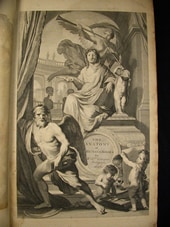Plagiarism in the 17th Century!
 The John Martin Rare Book Room recently acquired the first edition of William Cowper’s The anatomy of humane bodies (1698), one of the most controversial books in the history of medicine. Cowper (1666-1709), a renowned British surgeon and anatomist used copies of the 114 elegant plates already published by Govard Bidloo (1649-1713) in his Anatomia humani corporis (1685). On the frontispiece to his new book, Cowper pasted his own name over Bidloo’s, translated the Latin text into English, corrected some of the descriptions, and sold the book as his own. Cowper argued that the plates were originally published for yet a third author who had already died before Bidloo’s book was published and were, therefore, free for Cowper to use. Bidloo then brought Cowper before the Royal Society where he was forced to defend himself with somewhat mixed results. The John Martin Rare Book room owns both Bidloo’s and Cowper’s works as well as a fascinating rejoinder that Cowper wrote to Bidloo to defend his actions.
The John Martin Rare Book Room recently acquired the first edition of William Cowper’s The anatomy of humane bodies (1698), one of the most controversial books in the history of medicine. Cowper (1666-1709), a renowned British surgeon and anatomist used copies of the 114 elegant plates already published by Govard Bidloo (1649-1713) in his Anatomia humani corporis (1685). On the frontispiece to his new book, Cowper pasted his own name over Bidloo’s, translated the Latin text into English, corrected some of the descriptions, and sold the book as his own. Cowper argued that the plates were originally published for yet a third author who had already died before Bidloo’s book was published and were, therefore, free for Cowper to use. Bidloo then brought Cowper before the Royal Society where he was forced to defend himself with somewhat mixed results. The John Martin Rare Book room owns both Bidloo’s and Cowper’s works as well as a fascinating rejoinder that Cowper wrote to Bidloo to defend his actions.
To compare the frontispieces of the two works, click here.
For more information about the John Martin Rare Book Room please visit the website at http://www.lib.uiowa.edu/hardin/rbr/ or contact Ed Holtum, Assistant Director for Administrative Services and Special Collections, at 335-9154 or edwin-holtum@uiowa.edu.